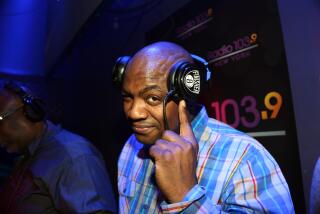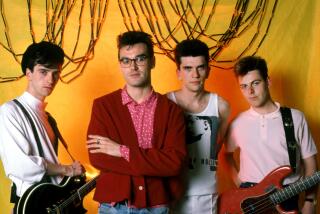Andy Gibb, 1970s Pop Music Sensation, Dies in England at 30
Andy Gibb, a teen pop sensation in the late ‘70s who never emerged from the artistic shadow of his older brothers, the Bee Gees, died Thursday in a hospital northwest of London, England. He was 30.
A spokeswoman for Island Records in New York said Gibb was admitted to the John Radcliffe Hospital in Oxford on Monday for observation after complaining of stomach pains. The cause of death was not immediately announced.
Janet Kleinbaum, director of national publicity for Island, said Gibb, who underwent treatment for drug abuse in 1985 at the Betty Ford Center in Rancho Mirage, signed a recording contract with the recording company two months ago and “seemed to be very excited about resuming his music career.”
The singer, who lived in Miami in recent years, began singing professionally in his native Australia and burst onto the pop scene in the United States in 1977 with three straight No. 1 singles.
The records--”I Just Want to Be Your Everything,” “(Love) Is Thicker Than Water” and “Shadow Dancing”--were all written or co-written by brother Barry Gibb and coincided with the Bee Gees’ enormous “Saturday Night Fever” disco-era popularity.
Because of the connection with the vocal trio, who also include Maurice and Robin Gibb, the perception within the record industry at the time was that the creative spark behind Gibb’s hits came from his older brothers.
And Gibb himself was quick to salute the influence of his brothers. About them, he once said: “Their harmonies, their ballads, all influenced me greatly. I guess you could say I idolized the Bee Gees as a band and loved them as brothers.”
Al Coury, senior vice president in charge of marketing and promotion for Geffen Records in Los Angeles, worked with Gibb at RSO Records in 1977. He said Thursday that he was “deeply saddened” by the singer’s death and remembered Gibb as a “very handsome, charming and loveable young man.”
But he also said he worried during the RSO days about the impact of the sudden stardom.
“He was treated like a superstar from Day 1 . . . paid very well, lived like a king . . . traveled in private planes,” Coury said. “That can be dangerous to even the most mature person. And here was someone still in his teens. You had to worry about him . . . because you knew some day the hits were going to stop.”
The hits did stop for Gibb in 1981, and he tried to revive his career momentum by moving into other areas. He co-hosted the syndicated television show “Solid Gold” in 1981 and 1982, and appeared occasionally in various stage productions, including “The Pirates of Penzance” in 1981 at the Ahmanson Theatre in Los Angeles.
But Gibb, who was involved romantically in the early ‘80s with actress Victoria Principal, mostly made news in recent years with personal problems.
Cocaine Problem
The singer maintained that his problem with cocaine accelerated after the 1982 breakup with Principal, who had urged him to give up the drug.
He filed bankruptcy papers last September in Miami, declaring less than $50,000 in assets and more than $1 million in debts. He reportedly earned only $7,755 in 1986.
However, Gibb’s lawyer, John Kozyak, said Thursday that Gibb’s bankruptcy was discharged from Miami federal court in January and all of Gibb’s debts were settled.
He called the singer’s death “really a shock. The last time I saw him, he looked perfectly healthy to me. He was playing tennis.”
Saul Davis, a Los Angeles-based manager of rock bands, also worked with Gibb during the RSO Records period and kept in touch with him.
“The shame of it is I think Andy was ready to make a strong comeback,” Davis said. “He contributed more to the records than people realized and he was growing as an artist.”
Gibb was divorced from his wife, Kim, in 1978. The couple had a daughter, Peta, 12.
The family, which was making funeral arrangements, had no public statement.
More to Read
The biggest entertainment stories
Get our big stories about Hollywood, film, television, music, arts, culture and more right in your inbox as soon as they publish.
You may occasionally receive promotional content from the Los Angeles Times.










